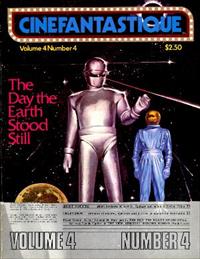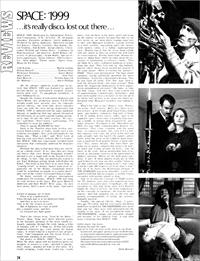Criticism
It's Really Disco Out There
From CINEFANTASTIQUE magazine, Volume 4, number 4, p24 (1975)
See also A New Science Fiction Teleseries from Britain (Cinefastique, Volume 4, No. 2 1975)
Scanned by Paulo Jorge Morgado


SPACE 1999 Syndicated by Independent Television Corporation. 1975. In Color. 24. 50 minute episodes. Executive producer, Gerry Anderson. Produced by Sylvia Anderson. Directors include Lee Katzin, Charles Crichton, Ray Austin, David Tomblin, Bob Kellett. Script editors Christopher Penfold and Johnny Byrne. Costumes by Rudi Gernreich. Art director, Keith Wilson. Director of photography, Frank Watts. Special effects, Brian Johnson. Effects director, Nick Allder. Theme music, Barry Gray. Music by Vic Elms.
John Koenig ------------- Martin Landau
Helena Russell ----------- Barbara Bain
Professor Bergman ------ Barry Morse
Alan Carter --------------------- Nick Tate
Paul Morrow ---------- Prentis Hancock
Dr. Mathias ---------------- Anton Philips
All the advance publicity would have us believe that SPACE: 1999 was destined to quickly become known as television's greatest science fiction show ever. To paraphrase Gershwin, it ain't NASAsarily so.
Despite the claims of both Gerry Anderson and Barry Morse (see production article 4:2:451) that scripts would have priority over the elaborate special effects, the first half - dozen episodes leave one with the very strong impression that SPACE: 1999 is afflicted with the same pandemic disease of pandering that has spread throughout all television. In an early episode Landau prepared to take off into the outer reaches "Be careful." - said Bain. "Don't worry." said Landau. "I'll remember to wear my rubbers."
They're paying $6.500.000 for that?
Back in the Thirties when Gale Gordon portrayed Flash Gordon on radio, maybe such a line would be acceptable. Yes, real astronauts do say things like. "What a ride!" and "Wow! Look at that big rock over there, fellows! She's a beauty!" But SPACE: 1999 has consciously scripted banal intrusions that continually undercut the dramatic situation.
Perhaps the idea is that such lines are intended as comedy relief. If so, then they are cheap one-liners that even Henny Youngman wouldn't attempt to get a laugh with on the Borsht Circuit. So cheap, in fact, that one practically yearns to see Earl Holliman getting drunk with Robbie the Robot. The truth is that there is no such thing as "comedy relief" in drama: humour must grow organically out or the drama... Legitimate humour could be something as simple as a faintly detectable curl at the corner of Leonard Nimoy's lips.
By sheer overkill of advance International syndicated TV bookings. SPACE: 1999 will hang on - lost out here in the stars. Why quote Maxwell Anderson and Kurt Weill? Well, gang, the men were poets. Here's more of the same. Just listen:
A bird of passage out of night
Flies in at a lighted door,
Flies through and on in its darkened flight
And then is seen no more.
This is the life of men on earth:
Out of darkness we come at birth
Into a lamplit room, and then
Go forward into dark again.
That's the chorus from "Lost In the Stars". Poetry. Okay. Now isn't there inherent poetry in the fantastic premise of the moon finally released, spinning through the void, taking a tribe of humans with it? I think so. If this had really happened centuries ago, even minus its human cargo, it would today be a legend of epic proportions. Like Gilgamesh and The Great Flood. It would have variants in all cultures.
But poetry in SPACE 1999? There is none. When the show opens with its pointless quick cut snippets of scenes to come, synched to pseudo-disco music, abandon all hope ye who enter. It's really swinging, really mod, really hip, really disco, lost out there in the stars, and I only bring up the matter of poetry because they did - in one nice scene on one show where Landau came face to face with Margaret Leighton, a great actress in a well-written, fascinating part - the omniscient spokes-entity of a fading superspiritual race. Destiny has it that the moon must collide with her planet so they can achieve the next level of consciousness. Koenig must trust. Koenig returns to Alpha Base where he talks about the necessity of maintaining a collision course. They all think he's nuts - radiation madness or something like that. They lock him up. Big fistfight. Special effect shows moon sucked into gravity of the giant planet. When it touches the surface - POOF: There goes perspiration! The huge planet vanishes, having spiritually absorbed the mere Earthlings. Everyone congratulates Koenig. Yes, he was right all along. End. But, wait, what about the integral theme - the issue of trust? What about the staggering implications of their magnificent metaphysical encounter'? Oh. haha, no. time for that "cause, look out!, here come a whole lot of superswinging commercials, heyheyhey! And next week maybe even a monster or two for all of us idiots lost out here in the stars who didn't understand what Margaret Leighton was talking about.
What's the tally so far? Humour, none, Poetry, one scene. Next: science. Well. yes, there is token science. A lot of talk about black holes, black suns, anti-matter, radiation, that sort of thing. A lot of sliding doors which, oddly, have to be zapped to open --- more time-consuming than turning a handle or having them triggered by automatic sensors. You figure it out. Then there are little two-way video communication devices everywhere. They come complete with the usual flaw --- no camera in sight, but, even if it's a hidden camera, how come the actor in the shot can walk around, turn his hack to the gadget and so forth, while the actor on the vidphone must maintain a rigid full front posture before a fixed camera? Yes, minor details. But then there are some not so minor --- planets that seem to be minus stars just tooling around out there, lost out there in the void, and an inexplicable lack of interest in informing viewers (in the particulars of Alpha's survival. Where are the hydroponic gardens, if any? If these planets really are in orbit (and it they're not, how are they visible? where is all that reflected light coming from?), how come it doesn't take 300 years to get from star to star? For all of its flaws, the Heinleinian premise of The Starlost was more plausible, a self-contained world that did not require a weekly chance encounter with another planet or ship.
Just as in network coverage of NASA events, the TV audience gets only a few superficial facts or science on a given piece of hardware, the only exception to this rule being when Evel Knievel blasts off. Fact or fiction, the more sophisticated the concepts or hardware, the less the information. And that unspoken law is the true and genuine irresponsibility of media. So, science, blatantly ignored.
Finally, the special effects. Okay, I agree, they are TV's best. But the toys Gerry and Sylvia Anderson created for Thunderbirds were more than just fun --- they were fully integrated into the totality of the show. If one accepted the form of Thunderbirds, unique and innovative and despite and because of its tabletop look, it was often more convincing than SPACE: 1999
Little stars, big stars,
Blowing through the night
And we're lost out here in the stars in our Rudi Gernreich ultrapure permacrease bellbottoms, so stay tuned supermonsters superantispace buysomethingforevervone buyant it boughtdisco fastfastertastesthisepisodebuytake 2 monsterslowestcommondenominator54321 tuneitintothisepisodelost, lost out here...
Bhob [Brian] Stewart